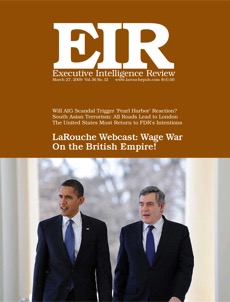March 21 Webcast: LaRouche Declares War on the British Empire
by Lyndon H. LaRouche, Jr.
“This is going to be a highly structured presentation,” Lyndon LaRouche told his webcast audience, “because we’re dealing with a breaking point in world history, and it can be a breakdown point or an upturn in the process. This is a deadly moment. We’ve come to a time—you know, lots of people will say, ‘Why don’t you break it down in more simple language, so we can understand it?’ I say, ‘Well, partner, why don’t you just sit there and let other people make the decision, then?’
“Because this requires some technical competence. We’re dealing with a technical question of a present breakdown, and the alternative of a reorganization to survival of the entire world’s—the entire planet’s!—monetary-financial and physical-economic system!... Those who say, it’s too much for them to understand, they want it broken down in simple language, should shut up! And listen: maybe they will learn something.”
World News
Will AIG Scandal Trigger New ‘Pearl Harbor’ Reaction?
by John Hoefle
The payment by AIG of $165 million in bonuses to its derivatives traders—the guys who blew up the company and have already cost taxpayers close to $200 billion—has generated public fury, and rightfully so. But the real question is whether that rage will dissipate in mere protest, or be channeled into constructive action, as we did after Pearl Harbor in 1941.
South Asian Terrorism: All Roads Lead to the British Empire
by Ramtanu Maitra
Since none of the South Asian countries have, so far, shown the ability to evaluate, and thus, eliminate, terrorism, it is necessary to know its genesis, and how it has affected the leaders of the South Asian nations, to the detriment of their respective security. Part 1 of a two-part series.
Is Southwest Asia Preparing for Obama’s or Netanyahu’s ‘Change’?
by Hussein Askary
Only a forceful intervention by the United States in Israel can thwart the threats to the peace process. What’s needed is to end the legacy of the British Empire in the region, once and for all. The first signs from Washington are encouraging, but no one should rest on their laurels for the moment, not the least President Obama and the Arab leaders.
Strategy
LaRouche: We Must Return to FDR’s 1944 Intention
by Lyndon H. LaRouche, Jr.
Lyndon LaRouche’s opening remarks to a private diplomatic luncheon on March 19, 2009.
LaRouche to Colombian Military University: Proposals To Solve the Global Economic Crisis
by Lyndon H. LaRouche, Jr.
LaRouche’s teleconference address to some 600 students, teachers, and military personnel, at the Nueva Granada Military University in Bogotá, Colombia, on March 18. The event was sponsored by the Association of Graduates of the Economics Department of the University.
Conference Report
Schiller Institute: Principles for Rebuilding the Bankrupt World Economy
The Institute’s Feb. 21-22 conference in Germany featured a broad array of presentations on the crisis and what to do about it. In this, our third selection of speeches from the conference, we feature speakers from Germany, France, and Italy.
The Future of the Euro
by Wilhelm Hankel
Professor Hankel is former head of the Money and Credit Department of the German Finance Ministry and former chief economist of the Kreditanstalt für Wiederaufbau.
Hankel’s Decade-Long Fight Against the Euro
The Crisis, or Abandoning the ‘Politique’
by Eric de la Maisonneuve
Eric de la Maisonneuve, Division General (2S) is currently the president of Société de Stratégie in Paris.
Small and Medium-Sized Entrepreneurs Are the Backbone of Italy’s Economy
by Hon. Catia Polidori
Hon. Catia Polidori is a member of the Italian Chamber of Deputies who serves on the parliament’s Committee on Industry and Trade.
Editorial
London Declares World War III



